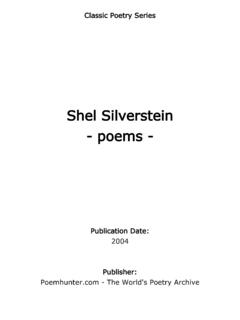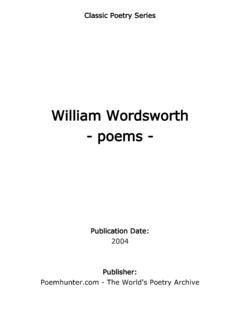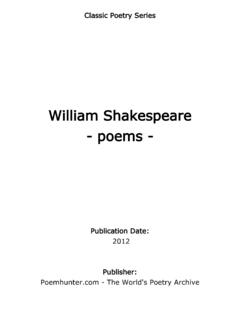Transcription of Mewlana Jalaluddin Rumi - poems - Poem Hunter
1 Classic Poetry Series Mewlana Jalaluddin Rumi- poems - Publication Date:2004 - The World's Poetry ArchiveMewlana Jalaluddin Rumi(1207 - 1273) Jalal ad-Din Muhammad Balkhi (Persian: ?????????? ???? ?????), also known asJalal ad-Din Muhammad Rumi (?????????? ???? ????), and more popularly in theEnglish-speaking world simply as Rumi (30 September 1207 17 December1273), was a 13th-century Persian[1][6] poet, jurist, theologian, and Sufimystic.[7] Iranians, Turks, Afghans, Tajiks, and other Central Asian Muslims aswell as the Muslims of South Asia have greatly appreciated his spiritual legacy inthe past seven centuries.[8] Rumi's importance is considered to transcendnational and ethnic borders. His poems have been widely translated into many ofthe world's languages and transposed into various formats.
2 In 2007, he wasdescribed as the "most popular poet in America."[9] Rumi's works are written in Persian and his Mathnawi remains one of the purestliterary glories of Persia,[10] and one of the crowning glories of the Persianlanguage.[11] His original works are widely read today in their original languageacross the Persian-speaking world (Iran, Tajikistan, Afghanistan and parts ofPersian speaking Central Asia).[12] Translations of his works are very popular inother countries. His poetry has influenced Persian literature as well as Urdu,Punjabi, Turkish and some other Iranian, Turkic and Indic languages written inPerso-Arabic script Pashto, Ottoman Turkish, Chagatai and Jalal ad-Din Mu?ammad Balkhi (Persian: ?)
3 ????????? ???? ????? Persianpronunciation: [d? l??l ddi?n moh mm de b lxi?]) is also known as Jalal ad-Din Mu?ammad Rumi (?????????? ???? ???? Persian pronunciation:[d? l??l ddi?n moh mm de ?u?mi?]). He is widely known by the sobriquetMawlana/Molana[1][4] (Persian: ??????? Persian pronunciation: [moul??n??]) inIran and Afghanistan, and popularly known as Mevl na in Turkey. According tothe authoritative Rumi biographer Franklin Lewis of the University of Chicago,"[t]he Anatolian peninsula which had belonged to the Byzantine, or easternRoman empire, had only relatively recently been conquered by Muslims and evenwhen it came to be controlled by Turkish Muslim rulers, it was still known toArabs, Persians and Turks as the geographical area of Rum.
4 As such, there are anumber of historical personages born in or associated with Anatolia known asRumi, a word borrowed from Arabic literally meaning Roman, in which contextRoman refers to subjects of the Byzantine Empire or simply to people living in orthings associated with Anatolia. In Muslim countries, therefore, Jalal al-Din is notgenerally known as "Rumi"."[13] The terms ????? Mawlavi (Persian) and Mevlevi(Turkish) which mean "having to do with the master" are more often used forhim.[14] - The World's Poetry ArchiveRumi was born to native Persian speaking parents,[15][16][17] probably in thevillage of Wakhsh,[3] a small town located at the river Wakhsh in Persia (in whatis now Tajikistan). Wakhsh belonged to the larger province of Balkh (parts of nowmodern Afghanistan and Tajikistan), and in the year Rumi was born, his fatherwas an appointed scholar there.
5 [3] Greater Balkh was at that time a major center of a Persian culture[11][17][18]and Khorasani Sufism had developed there for several centuries. Indeed, themost important influences upon Rumi, besides his father, are said to be thePersian poets Attar and Sanai.[19] Rumi in one poem express his appreciation:"Attar was the spirit, Sanai his eyes twain, And in time thereafter, Came we intheir train"[20] and mentions in another poem: "Attar has traversed the sevencities of Love, We are still at the turn of one street".[21] His father was alsoconnected to the spiritual lineage of Najm al-Din Kubra.[8] He lived most of his life under the Persianate[22][23][24] Seljuq Sultanate ofRum, where he produced his works [25] and died in 1273 AD.
6 He was buried inKonya and his shrine became a place of pilgrimage.[26] Following his death, hisfollowers and his son Sultan Walad founded the Mevlevi Order, also known as theOrder of the Whirling Dervishes, famous for its Sufi dance known as the Samaceremony. He was laid to rest beside his father, and over his remains a splendidshrine was erected. A hagiographical account of him is described in Shams ud-Din Ahmad Aflaki's Manaqib ul-Arifin (written between 1318 and 1353). Thishagiographical account of his biography needs to be treated with care as itcontains both legends and facts about Rumi.[27] For example, Professor FranklinLewis, Chicago University, in the most complete biography on Rumi has aseparate section for the hagiographical biography on Rumi and actual biographyabout him.
7 [28] Rumi's father was Baha ud-Din Walad, a theologian, jurist and a mystic fromWakhsh, who was also known by the followers of Rumi as Sultan al-Ulama or"Sultan of the Scholars". The popular hagiographer assertions that have claimedthe family's descent from the Caliph Abu Bakr does not hold on closerexamination and is rejected by modern scholars.[28][29][30] The claim ofmaternal descent from the Khwarazmshah for Rumi or his father is also seen as anon-historical hagiographical tradition designed to connect the family withroyalty, but this claim is rejected for chronological and historicalreasons.[28][29][30] The most complete genealogy offered for the familystretches back to six or seven generations to famous Hanafi Jurists.
8 [28][29][30] We do not learn the name of Baha al-Din's mother in the sources, but only thathe referred to her as "Mami" (Colloquial Persian for Mama)[31] and that she - The World's Poetry Archivea simple woman and that she lives in 13th century. The mother of Rumi wasMu'mina Khatun. The profession of the family for several generations was that ofIslamic preachers of the liberal Hanafi rite and this family tradition was continuedby Rumi (see his Fihi Ma Fih and Seven Sermons) and Sultan Walad (see Ma'rifWaladi for examples of his everyday sermons and lectures). When the Mongols invaded Central Asia sometime between 1215 and 1220, Bahaud-Din Walad, with his whole family and a group of disciples, set out to hagiographical account which is not agreed upon by all Rumischolars, Rumi encountered one of the most famous mystic Persian poets, Attar,in the Iranian city of Nishapur, located in the province of Khorasan.
9 Attarimmediately recognized Rumi's spiritual eminence. He saw the father walkingahead of the son and said, "Here comes a sea followed by an ocean."[this quoteneeds a citation] He gave the boy his Asrarnama, a book about the entanglementof the soul in the material world. This meeting had a deep impact on theeighteen-year-old Rumi and later on became the inspiration for his works. From Nishapur, Walad and his entourage set out for Baghdad, meeting many ofthe scholars and Sufis of the city.[32] From Baghdad they went to Hejaz andperformed the pilgrimage at Mecca. The migrating caravan then passed throughDamascus, Malatya, Erzincan, Sivas, Kayseri and Nigde. They finally settled inKaraman for seven years; Rumi's mother and brother both died there.
10 In 1225,Rumi married Gowhar Khatun in Karaman. They had two sons: Sultan Walad andAla-eddin Chalabi. When his wife died, Rumi married again and had a son, AmirAlim Chalabi, and a daughter, Malakeh Khatun. On 1 May 1228, most likely as a result of the insistent invitation of 'Ala' ud-DinKey-Qobad, ruler of Anatolia, Baha' ud-Din came and finally settled in Konya inAnatolia within the westernmost territories of the Seljuk Sultanate of R m. Baha' ud-Din became the head of a madrassa (religious school) and when hedied, Rumi, aged twenty-five, inherited his position as the Islamic molvi. One ofBaha' ud-Din's students, Sayyed Burhan ud-Din Muhaqqiq Termazi, continued totrain Rumi in the Shariah as well as the Tariqa, especially that of Rumi's nine years, Rumi practiced Sufism as a disciple of Burhan ud-Din until thelatter died in 1240 or 1241.











